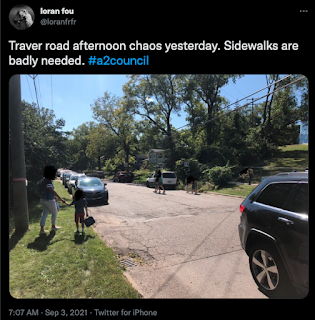Vote August 2nd, for a Progressive Future
Ann Arbor is essentially a one-political-party city these days, so the local election is always decided in the Democratic primary, this year on August 2nd. Any-reason absentee voting has already begun, click here to find out how you can vote locally. This year, the city's voters have a choice, and despite the party labels being the same, the candidates could not be more different in some of the major ways city life is shaped. The progressive slate is Mayor Chris Taylor, Cynthia Harrison, Chris Watson, Ayesha Ghazi Edwin, Dharma Akmon, and Jenn Cornell. These candidates offer a positive forward-looking vision of our city, in which we rise to meet the challenges facing our city including the dual crises of climate change and housing.
The "small-c" conservative slate running this year is comprised of mayoral candidate Anne Bannister, council candidates Ali Ramlawi, Elizabeth Nelson, and Angeline Smith. In the case of incumbents Ramlawi and Nelson, and former councilmember Bannister, the public has a clear enough voting record to establish some common patterns. These candidates are consistently anti-housing, anti-safe streets, and anti-change in general, and thus have a poor record on substantive climate-change actions. Additionally — and concerningly — Ramlawi, Nelson, and Bannister have all repeatedly defended their council ally Jeffrey Hayner over his use of slurs. And they have used their power of office to politicize the day-to-day administration of our city, often governing by spite and engaging in conspiracy theories. Ward 1 newcomer Angeline Smith has no public record of votes to judge, but it is important to recognize that the supporters and volunteers guiding her are the same as those behind the scenes of the other candidates on the conservative slate.
Anti-housing positions and votes
In our race to meet the climate and housing crises head-on, land use is a significant tool in our arsenal. And yet, the conservative slate consistently votes against housing, even when significant portions are set aside to be affordable. Here are a few examples of these votes:
March 2019, Bannister, Nelson, and Ramlawi voted against Lockwood, a development that would have provided badly needed affordable senior housing facilities for 99 years.
Early 2019, Bannister, Nelson, and Ramlawi voted to reject proposed changes in ADU restrictions in residential zones. ADUs, or "granny flats," are one small way to help citizens age in place and develop more affordable housing.
In 2021, Nelson and Ramlawi again voted against relaxing restrictions on ADUs.
In 2019, Nelson, Ramlawi, and Bannister joined the other conservatives on council to reject Brightdawn apartments, a full 1/4 of which were designated to be affordable housing.
2020, Nelson and Bannister voted to implement a moratorium of any new development in C1A or C1A/R zoning districts, ostensibly as a backlash to the new campus-adjacent development Beekman on Broadway.
June 2021, Ramlawi and Nelson voted against Valhalla, a 454 unit housing complex near Stadium. Valhalla is fully electrified — in keeping with Ann Arbor's A2zero climate initiative — and located adjacent to a grocery store and along public transit routes.
Anti-Safe Streets votes
 |
| Opportunities Lost: safe routes to school |
One of Ann Arbor's climate initiatives calls for a decrease in vehicle miles traveled, and Vision Zero calls to dramatically reduce deaths on our roads, but we won't get there by making roads less safe for all users. Instead of backing evidence-based interventions proven to reduce road deaths by 40%, Bannister, Nelson, and Ramlawi all voted consistently against staff-recommended road reconfigurations from the very beginning of their tenures on city council.
In 2019, sidewalks were on the table. Bannister, Nelson, and Ramlawi voted to defeat a Northside STEAM K-8 school "Safe Routes to School" grant - despite warnings that rejecting the grant could compromise the city's ability to win future SRTS grants - which would have provided more than $400,000 in funding to help build sidewalks in the surrounding neighborhood, on Traver and other streets.
The conservatives on council voted to force staff-initiated road reconfigurations to come before council. This action effectively served to block city staff from implementing safety improvements in road design without council approval, which they often denied.
Bannister, Nelson and Ramlawi voted against a road reconfiguration on Earhart road which would have included improved safety infrastructure for all users — drivers, cyclists and pedestrians alike.
At the same meeting, Bannister, Nelson, and Ramlawi also voted down a staff-requested reconfiguration of Green Road that offered improved safety for all road users at the Plymouth/Green intersection.
At that meeting, Bannister also opposed reconfiguration of the minor street Traverwood on the city's northeast side.
Nelson and Ramlawi voted against accelerating long-deferred safety improvements to Nixon Road in 2020.
A committed defense of Jeffrey Hayner’s bigotry
After their colleague and ally Jeffrey Hayner was found to be using homophobic slurs online in a rant against his treatment by the media, the LGBTQ community rose up and called for his resignation, and called upon council to rebuke him formally. In response to the outrage, Nelson and Ramlawi voted against even the symbolic step of asking Hayner to resign. Anne Bannister, who was voted off council in 2020, nevertheless emailed privately and called publicly to defend Hayner, espousing a conspiracy theory that rebuking Hayner was actually "about pursuing 'overly permissive housing policy' with a new super majority."
When Hayner doubled down on his behavioral issues and used the N-word in an interview with an MLive journalist, his allies again rushed to his defense. Nelson wrote a screed defending his language, saying that he wasn't really using slurs but rather "phonetic sounds without euphemism." Nelson, Ramlawi, and Bannister repeatedly attempted to defend and excuse his behavior and language, which calls into question their commitment to Diversity, Equity and Inclusion.
Politicizing the Oversight of City Administration
Under Nelson and Ramlawi's tenure, Ann Arbor has had 3 city administrators. The first administrator, Howard Lazarus, was fired by Bannister, Nelson, and Ramlawi and their allies shortly after gaining power. This unpopular sacking, about which much has been written, led to the ouster of many of their council allies, including CM Bannister herself, in the last election by overwhelming margins. Lazarus was given a large severance package, and released "without cause."
At the time Nelson described this process as "routine," that cities part with administrators all the time for many reasons. Despite signing a non-disparagement clause, Nelson and Ramlawi continued to hurl unsubstantiated accusations at Lazarus, prompting a cease and desist letter from Lazarus’ lawyers.
Contrast that with the next administrator, Tom Crawford, who was found by an independent investigation to have acted improperly with serious lapses in judgment. Nelson disregarded the findings of the investigator, instead pushing an improbable conspiracy theory that assistant administrator Fournier was plotting to overthrow the ousted Crawford.
This rhetoric obviously doesn't square with her previous thoughts about the sacking of Lazarus, who was fired with no official investigation, without cause. These two reactions differ so wildly that it only makes sense if Nelson was trying to avoid political consequences in firing Lazarus, and score political points when Crawford was fired.
| CM Nelson: on firing Lazarus |
| CM Nelson: on firing Crawford |
Later, another investigation was launched over accusations against Ann Arbor's assistant city administrator John Fournier. Sitting Councilmembers Nelson and Ramlawi inappropriately met in private with the complainant during an ongoing independent investigation. Ramlawi was later found to have leaked the internal (and confidential) HR complaint to a local partisan political blogger. The investigation found the complaint against the assistant city admin without merit, while formally rebuking Ramlawi and Nelson for their reckless breach of confidentiality.
At one point, Ramlawi was so upset about the fact that he and his slate were not getting their way, despite losing badly in 2020, that he suggested Governor Whitmer step in and appoint an emergency manager.
This conservative slate as a whole is unserious, in both their style and substance of governance. They govern by grievance and espouse conspiracies, and more often than not get in the way of progress in our small yet vibrant city. Luckily we have better options available, in the form of a progressive slate of candidates who are willing to address the city’s biggest challenges. Move Ann Arbor forward. Vote Taylor, Harrison, Watson, Ghazi Edwin, Akmon, and Cornell.
-The Damn Arbor Editorial Board










